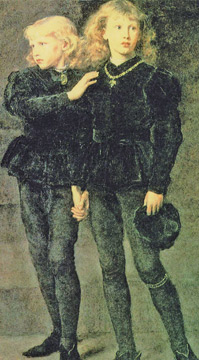The wars of the roses
by Gwen Herat
I bet very few Britons would know exactly what took place that led to
the War of the Roses as much as we do though even their greatest
playwright William Shakespeare in one of his plays, reveals the history
behind it in dialogue. The complex story behind this period in England's
history which Shakespeare investigated along with the mysteries
connecting the sudden marriage of Edward IV and the seizing of Edward's
throne by his brother Richard of Glocester that tied up one of the most
heart-rending killing of the innocent, Richard's nephews in the Tower of
London. This gruesome act turned history in another direction which
otherwise would have prevented the Wars of the Roses.
 I read somewhere that a contemporary of Shakespeare saying that he
dashed off these plays without blotting a line until history was
genuine. They had come spontaneously from a fully-charged mind. We can
take it for granted that his habit of historical research to please
himself and perhaps some part of this intense reality, can make us
understand the full impact of the Wars of the Roses, though so much
years apart. I read somewhere that a contemporary of Shakespeare saying that he
dashed off these plays without blotting a line until history was
genuine. They had come spontaneously from a fully-charged mind. We can
take it for granted that his habit of historical research to please
himself and perhaps some part of this intense reality, can make us
understand the full impact of the Wars of the Roses, though so much
years apart.
To understand the vicious wars between the English noble houses of
York and Lancashire and their royalty involved, the best guide is
William Shakespeare's plays. The Bard may not be very familiar with
English history, which marked the end of medieval English and the birth
of the Renaissance. This was the end of its 30-year period of strife and
bloodshed, the shame of England which the succeeding generations have
called the Wars of the Roses.
Tudors
This saw the collapse of the great Plantagene dynasty who were the
rulers of all England and much of France for over 300 years. It also saw
the rise of the Tudors who were destined to dominate the English
political era during the next century followed by the triumph of Henry
Tudor over Richard III at Bosworth Field. Many would agree that Richard
is the villain of the piece and responsible for the wars in which he met
his own death.
Henry VI who is yet a child struggles among the lords who ruled
England, and the French led by Joan of Arc, wins back the lands held by
England. As a part of an agreement for peace, the boy Henry is married
off to Princess Margarat of Anjou. This is followed by the Wars of the
Roses again when England is torn by civil war. For the battles to be
won, Lancaster chooses red roses and white roses for Yorkshire. The
disgarced son of Duke of York, Richard Plantagenet leads the Yorkists
while the Duke of Gloucester leads Lancaster. They both engage in open
battle and kill all those who oppose them, especially behind the scenes.
Henry grows up to be a religious man often occupied with the church
to protect himself while Margaret takes over his duties and leads the
troops into battle but Henry is captured and disposed. Though Edward is
crowned king, the Lancastrians fight back and are finished off while
Henry is a prisoner in the Tower of London. Because he is still a threat
to the Yorkists, Richard and Edward kill him which sets the stage for
Richard to become king.
Infamous King
The most infamous king in British history, king Richard III was born
in 1452 and died at Bosworth Field in 1485. He reigned only for two
years during which time he committed the bloodiest murders of his kith
and kin including his two innocent young nephews at the London's Tower.
Like most historians, Robin Neillands was motivated by the subjects
that he majored in; modern history at Oxford and Reading Universities.
There is considerable scope for debate as to what acts led to which
consequences. The run-up to the Wars of the Roses and the aftermath has
dazzled the imagination of scholars as they unravel its hidden
consequences and one such person is Robin Neillands who in this book,
has handles the confusing period of English history.
|

The assassination of the two princes changed the course of
British history
and royal lines of reign. |
He is so minutely accurate to the dot, the book is enough even to do
a theory by it self without any supportive subjects. That's how good he
is. The beginning is uncertain. He questions:
Did trouble start when Henry Bolingbroke usurps the throne of Richard
II?
When Henry V died in 1422 with his conquests incomplete
The power struggle between Cardinal Beaufort and Humphrey, Duke to
Gloucester.
When Henry VI concluded decades of his incompetent rule with bouts of
insanity.
And many more who had their parts to play in the Wars of Roses.
Neillands kick starts this book with there the hundred years of war
ended, with the English defeat at Castillion which was the final bout of
relations between Dukes of York and Someset which triggered the 30-year
period.
He traces the compexity of this period through to 1455 and continues
to Battle of Bosworth Field where the formation adopted by King
Richard's army to the foul deeds planned and committed by him; the
medieval mysteries, the death of Edward, Prince of Wales, and the
subsequent deaths of Richard, Duke of York, and the innocent young
Princes at the Tower.
Colourful past
And finally, Neillands rounds off the colourful past of England's
past with the death of Princes in the Tower and the final extirpation of
the dynasty of Plantagenet.
For scholars past and present, students of English history and the
general public in search of enlightenment on the Wars of the Roses,
there can never be a book better than this. It will find a permanent
place in any library. |

